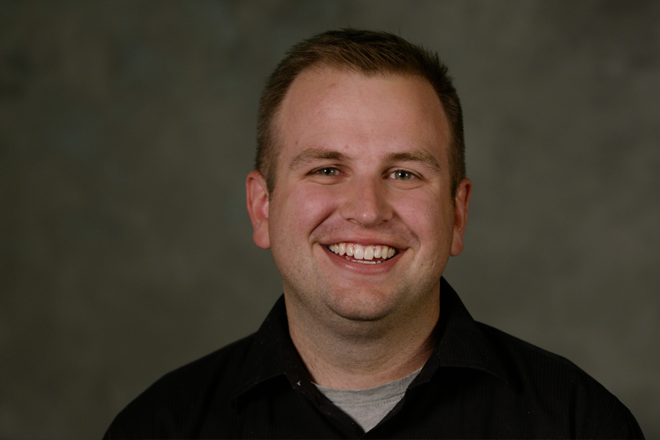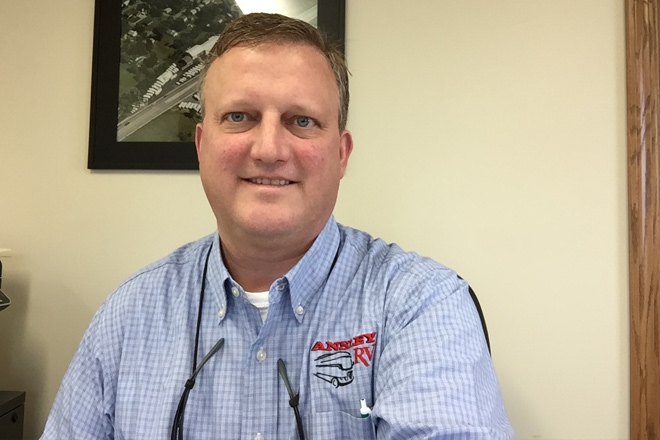For over 20 years, Scott Click has been intrigued by the prospect of starting a 20 Group in the pet retailer industry. Throughout his career, Click’s experienced industry growth, waiting for the right time for his peers and him to reap the benefits of a 20 Group.
The rise of the big-box pet stores forced independent retailers like Tomlinson’s Feed and Pets to make adjustments in order to not only survive, but thrive in the marketplace. Click understands that in order to continue succeeding, he must continually seek out new ideas – better ways to do business. This inspired him to take 20 Groups from a good idea to a great investment. Today, Click is a member of the inaugural Spader 20 Group for independent pet specialty retailers.
Scott Click: I grew up in this business. My dad bought Tomlinson’s in 1971. Back then it was just an old feed store in one location. When I was eight years old, I walked in and my dad handed me a scrub brush and a pair of rubber gloves and said, “There’s the toilet, you’re never too good for anything.” That was my first job.
When I got out of college back in the mid-‘80s, I came in full time and at that point we started adding more stores, because the pet industry was beginning to evolve. People like PetSmart, Petco came onto the scene and those of us who stayed in business had to grow and learn how to be a better retailer. I’ve often said that when PetSmart and Petco came to town, I became a better businessman. We have eight stores now and next week we’re starting construction on number nine and already are starting to look for number ten in the area, so we’re continuing to grow.
When did you feel the need for a 20 Group in your industry?
SC: It really started kind of back in the ‘80s when the industry was changing. My in-laws had a business in the auto collision repair business – the auto body business. Sitting around the dinner table with my in-laws over the years they would talk about their 20 Group and how much it meant to them and what they got out of it. Well, at that time, the pet industry really wasn’t at a stage, I didn’t think, where it could have 20 Groups. And so as the industry evolved and changed, I’ve always been watching and talking and thinking, “When is the pet industry going to be at a point where it can support a 20 Group and can benefit from a 20 Group?” And so a few years ago, I felt like it was kind of getting there. So, I started talking to others in the industry – manufacturers and all that – and I would tell them about my idea for a 20 Group. And again, they didn’t really know what that was, but I would tell them, and they’d say, “I think that’s a good idea.” Last year it finally came to a head, where we actually started putting a group together. We found Spader and it just kind of evolved from there. I’ve been thinking about it for over 20 years.
Why is Spader the right fit to guide the pet retailer industry?
SC: I called Steve King at Pet Industry Distributors Association (PIDA). I told [Steve] what 20 Groups were and what I thought they could do and over a few months he found Spader. I’d never heard of Spader at that point. But the more I learned about Spader, the more I realized they were just a perfect fit for what we wanted to do. I found out how they’d handled 20 Groups in the past. Last spring, Spader invited my wife Renae and I up to South Dakota for a week-long management seminar and we learned even more about what Spader has to offer and [became] more and more impressed about their vision, their knowledge – they’re having to learn about the pet industry specifically – but their knowledge of business, their knowledge of what it takes to run a good business has been very impressive to me. I think it’s been a great benefit for getting these 20 Groups off the ground.
How do you hope to see 20 Groups evolve your business and the industry?
SC: I come from a financial background, I have a degree in finance, so I’m a numbers guy, but the only numbers I had to compare to are publicly traded numbers, such as PetSmart. So I would look at PetSmart’s numbers and I would look at their gross margins and think, “Well, you know, we’re doing pretty good.” And that’s representative of the industry. [But] as I’ve looked at others in our group that are more directly related to our type of business, more than even PetSmart is, I realized we’re doing good – we could do better. And I think that’s one of the biggest benefits – finding how we can do better and where we can do better. There’s some very specific areas that we’ve looked at and realized hey, we’re missing the boat on this. We get so insulated in our own little environment and it’s easy to think, “Well, I’m doing pretty well. I’m pretty good.” I mean, a couple years ago … one of the trade magazines awarded us “Retailer of the Year.” Boy, we thought we were just, you know, really hot stuff – and thought, you know, we can’t get any better. Well, we found out, we can do a whole lot better. And when you look at the bottom line, there was a lot of growth there. It’s benefitted us even in the short period of time we’ve been involved in it.
Why do you feel that a Spader 20 Group is a good investment for yourself and for others who are interested?
SC: I’ve seen benefits in the bottom line and benefits in how professional we are. You know, exchanging the numbers is pretty scary for a lot of us, those of us who are independents, we’re not used to anybody seeing our numbers, except the banker. And I have to say, my dad, who is now retired, before I joined this group, I would talk to him and tell him what’s going on and one time he called me, he said, “You’re going to do what? And you’re going to share what? Are you sure about this?” That aspect of the group, I think, is really what makes it even more beneficial.
And I talk to others in other 20 Groups and ask them that specific question: Has it ever been a problem? And these are people who have been in 20 Groups for 20, 30 years – has it ever been a problem to share numbers? And they said, “Never. Never, never. Never been a problem.” But what it does when you actually get specific like that, you get beyond what they call the “coffee table talk.” You get beyond just the talk and you get down into specifics.
How does Spader help keep your numbers confidential?
SC: Spader sends us the numbers every month. There are no names attached to those monthly reports. Each retailer is just identified by a number and you’ve got your list of members separate. That’s one way I think it’s secure. As far as it being confidential, I believe they are. I’ve never seen any problems with that. I haven’t heard anybody have problems with it.
How do the relationships you develop with other Spader 20 Group members impact your business?
SC: [An owner in another industry once] told me, “It’s basically in informal board of directors.” I talk to my group members weekly. If I have in idea for something, thinking I want to do something, I call and talk to them. And a couple of them use the same phrase, they said, “When they look at your business, they’ll tell you if your baby’s ugly.” And I think that’s very meaningful to be not just critical, but be very objective and when we look at each other and talk to each other. We’re just developing those relationships in our group, but I think they are only strengthening.
What kind of business owners would you like to see in your 20 Group?
SC: More of what we have now from different areas of the country, particularly, will greatly enhance the benefits of the group.






